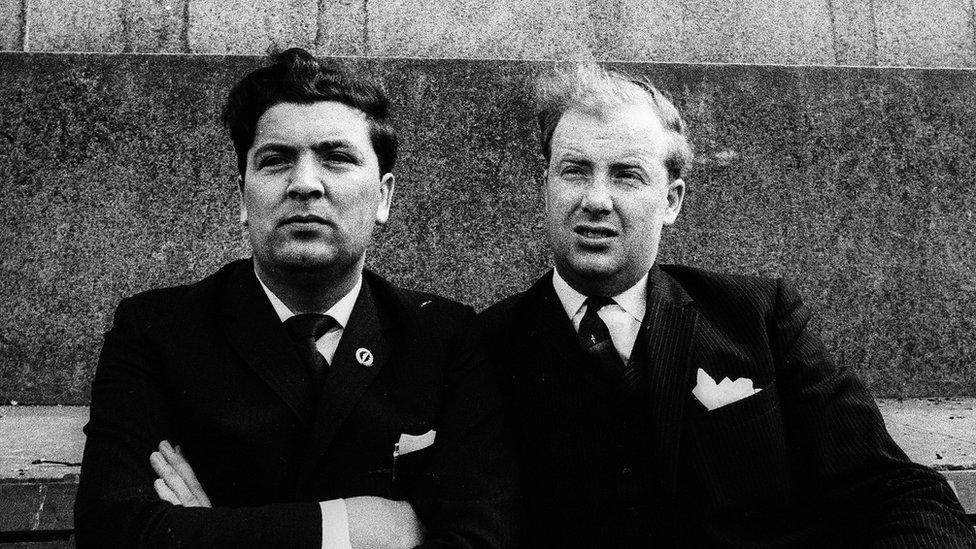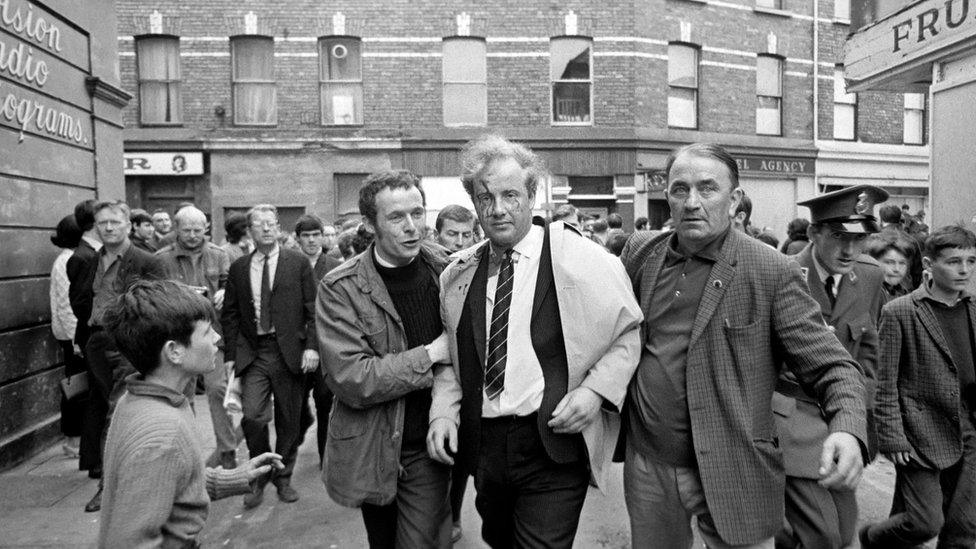Paul Greengrass hails Ivan Cooper as 'a great son of Derry'
- Published

John Hume (left) and Ivan Cooper were founding members of the SDLP
Civil rights leader Ivan Cooper has been called "a great son of Derry" by the director who charted the event which would help define him.
Bloody Sunday film director Paul Greengrass said: "You were filled with possibilities of hope in Ivan's company."
Mr Cooper died yesterday aged 75.
He was one of the leaders of the civil rights march in Londonderry in 1972 that ended in 13 people being shot dead on Bloody Sunday.
Mr Cooper was a founding member of the Social Democratic and Labour Party (SDLP) and played a major role in the Northern Ireland Civil Rights Association.
He born into a working-class Protestant and unionist family in Killaloo, County Londonderry, in January 1944.
Mr Greengrass met Mr Cooper when he was making the Bloody Sunday film which was released in 2002.
"I spent a day walking around Derry with Ivan for hours when we were making the film. It seemed like he knew every single person in the city.

Jimmy Nesbitt played Ivan Cooper in the Blood Sunday film directed by Paul Greengrass
"He was a man with a tremendous sense of humour and a twinkle in his eye but it was impossible not be struck by his moral seriousness and by his principles.
"I met him for dinner in Derry a few years ago and although he was in ill-health he still had that twinkle in his eye."
Actor Jimmy Nesbitt said playing Mr Cooper in the Bloody Sunday film was a "privilege and also a huge responsibility" which professionally changed his life.
Veteran civil rights campaigner Eamonn McCann said he first met Mr Cooper when he was chair of the youth branch of the Labour Party in Derry in 1968.

Eamonn McCann (left) alongside Ivan Cooper who was injured in rioting in Derry in August 1969
"I was arrested with Ivan on the morning of the 5th of October, we were in a van encouraging people to come along to the march on Duke Street that afternoon."
Mr McCann said Mr Cooper faced abuse throughout the years because he was "seen as someone who betrayed his community".
Mr Cooper was briefly involved in unionist politics before later becoming involved with the civil rights movement and with constitutional nationalism.
"I know Ivan found that hurtful. He took far more abuse than myself and John Hume."
'Controversial figure'
The former DUP speaker of the Stormont Assembly, Lord Hay, said Mr Cooper was seen as a "controversial figure".
"He was seen as throwing his lot in the with nationalism at that time. He continued to be seen as a controversial figure in the unionist community all his life."
Mr Cooper's funeral will take place in St Peter's Church in Culmore, Derry on Friday.
Allow X content?
This article contains content provided by X. We ask for your permission before anything is loaded, as they may be using cookies and other technologies. You may want to read X’s cookie policy, external and privacy policy, external before accepting. To view this content choose ‘accept and continue’.
Archdeacon of Derry, Robert Millar, said the civil rights leader was a "man who challenged all of us to work for a better society".
"He was a man of vision, a man of courage and a man of faith. He will be greatly missed by the city."